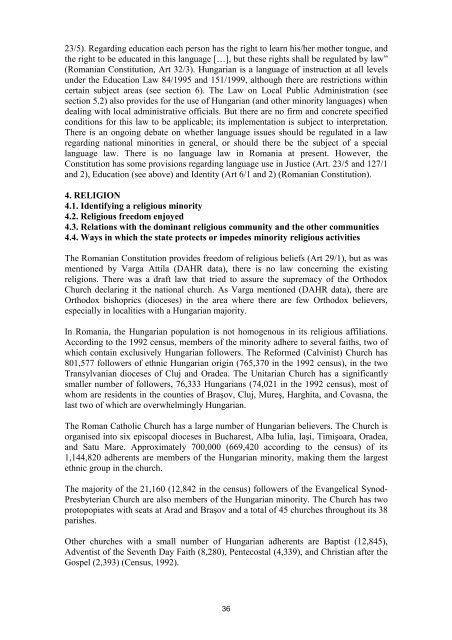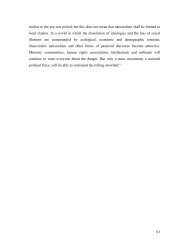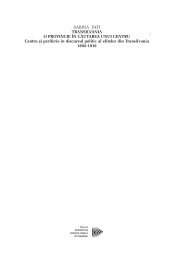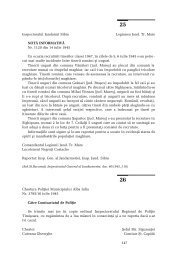Southeast Europe
Southeast Europe
Southeast Europe
You also want an ePaper? Increase the reach of your titles
YUMPU automatically turns print PDFs into web optimized ePapers that Google loves.
23/5). Regarding education each person has the right to learn his/her mother tongue, and<br />
the right to be educated in this language […], but these rights shall be regulated by law”<br />
(Romanian Constitution, Art 32/3). Hungarian is a language of instruction at all levels<br />
under the Education Law 84/1995 and 151/1999, although there are restrictions within<br />
certain subject areas (see section 6). The Law on Local Public Administration (see<br />
section 5.2) also provides for the use of Hungarian (and other minority languages) when<br />
dealing with local administrative officials. But there are no firm and concrete specified<br />
conditions for this law to be applicable; its implementation is subject to interpretation.<br />
There is an ongoing debate on whether language issues should be regulated in a law<br />
regarding national minorities in general, or should there be the subject of a special<br />
language law. There is no language law in Romania at present. However, the<br />
Constitution has some provisions regarding language use in Justice (Art. 23/5 and 127/1<br />
and 2), Education (see above) and Identity (Art 6/1 and 2) (Romanian Constitution).<br />
4. RELIGION<br />
4.1. Identifying a religious minority<br />
4.2. Religious freedom enjoyed<br />
4.3. Relations with the dominant religious community and the other communities<br />
4.4. Ways in which the state protects or impedes minority religious activities<br />
The Romanian Constitution provides freedom of religious beliefs (Art 29/1), but as was<br />
mentioned by Varga Attila (DAHR data), there is no law concerning the existing<br />
religions. There was a draft law that tried to assure the supremacy of the Orthodox<br />
Church declaring it the national church. As Varga mentioned (DAHR data), there are<br />
Orthodox bishoprics (dioceses) in the area where there are few Orthodox believers,<br />
especially in localities with a Hungarian majority.<br />
In Romania, the Hungarian population is not homogenous in its religious affiliations.<br />
According to the 1992 census, members of the minority adhere to several faiths, two of<br />
which contain exclusively Hungarian followers. The Reformed (Calvinist) Church has<br />
801,577 followers of ethnic Hungarian origin (765,370 in the 1992 census), in the two<br />
Transylvanian dioceses of Cluj and Oradea. The Unitarian Church has a significantly<br />
smaller number of followers, 76,333 Hungarians (74,021 in the 1992 census), most of<br />
whom are residents in the counties of Braşov, Cluj, Mureş, Harghita, and Covasna, the<br />
last two of which are overwhelmingly Hungarian.<br />
The Roman Catholic Church has a large number of Hungarian believers. The Church is<br />
organised into six episcopal dioceses in Bucharest, Alba Iulia, Iaşi, Timişoara, Oradea,<br />
and Satu Mare. Approximately 700,000 (669,420 according to the census) of its<br />
1,144,820 adherents are members of the Hungarian minority, making them the largest<br />
ethnic group in the church.<br />
The majority of the 21,160 (12,842 in the census) followers of the Evangelical Synod-<br />
Presbyterian Church are also members of the Hungarian minority. The Church has two<br />
protopopiates with seats at Arad and Braşov and a total of 45 churches throughout its 38<br />
parishes.<br />
Other churches with a small number of Hungarian adherents are Baptist (12,845),<br />
Adventist of the Seventh Day Faith (8,280), Pentecostal (4,339), and Christian after the<br />
Gospel (2,393) (Census, 1992).<br />
36









